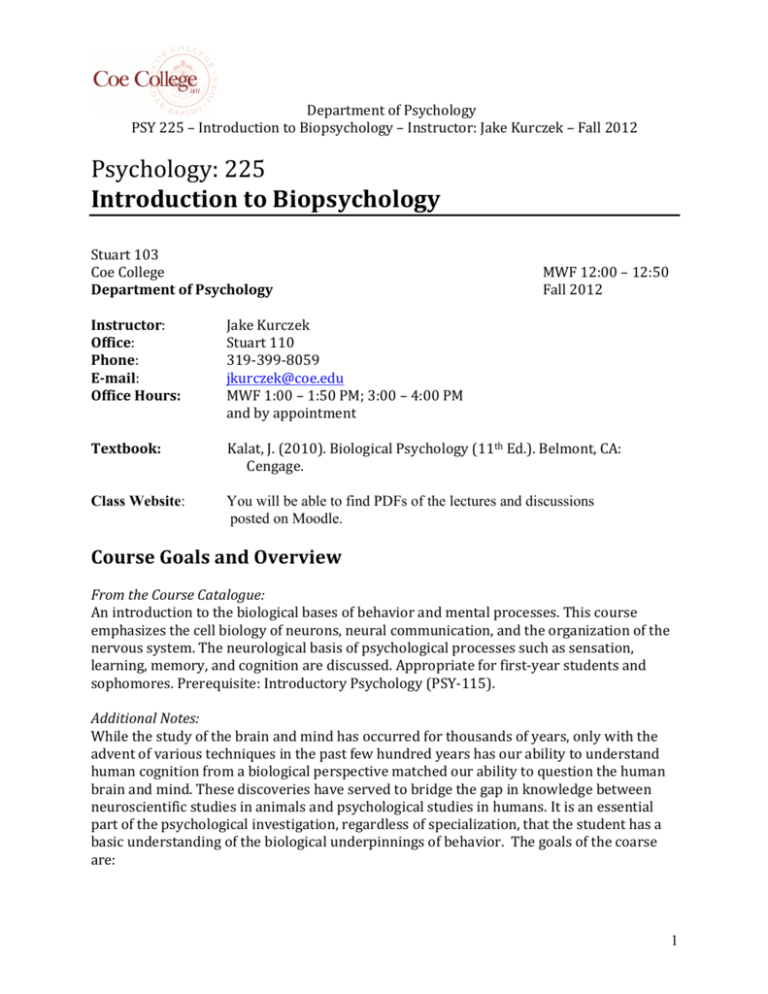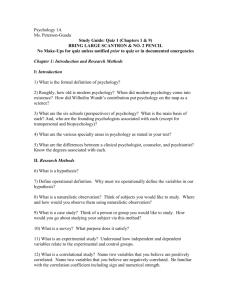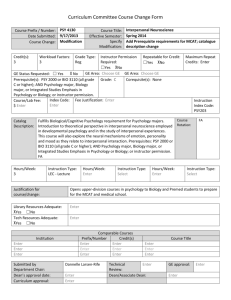Psychology: 225 Introduction to Biopsychology
advertisement

Department of Psychology PSY 225 – Introduction to Biopsychology – Instructor: Jake Kurczek – Fall 2012 Psychology: 225 Introduction to Biopsychology Stuart 103 Coe College Department of Psychology MWF 12:00 – 12:50 Fall 2012 Instructor: Jake Kurczek Office: Stuart 110 Phone: 319-­‐399-­‐8059 E-­‐mail: jkurczek@coe.edu Office Hours: MWF 1:00 – 1:50 PM; 3:00 – 4:00 PM and by appointment Textbook: Kalat, J. (2010). Biological Psychology (11th Ed.). Belmont, CA: Cengage. Class Website: You will be able to find PDFs of the lectures and discussions posted on Moodle. Course Goals and Overview From the Course Catalogue: An introduction to the biological bases of behavior and mental processes. This course emphasizes the cell biology of neurons, neural communication, and the organization of the nervous system. The neurological basis of psychological processes such as sensation, learning, memory, and cognition are discussed. Appropriate for first-­‐year students and sophomores. Prerequisite: Introductory Psychology (PSY-­‐115). Additional Notes: While the study of the brain and mind has occurred for thousands of years, only with the advent of various techniques in the past few hundred years has our ability to understand human cognition from a biological perspective matched our ability to question the human brain and mind. These discoveries have served to bridge the gap in knowledge between neuroscientific studies in animals and psychological studies in humans. It is an essential part of the psychological investigation, regardless of specialization, that the student has a basic understanding of the biological underpinnings of behavior. The goals of the coarse are: 1 Department of Psychology PSY 225 – Introduction to Biopsychology – Instructor: Jake Kurczek – Fall 2012 • To provide basic background on the biology underlying behavior, and importantly, how experience or environmental factors, alter the brain and behavior. The building blocks of neuroscience, namely, the structure and physiology of the nervous system, will be introduced during the initial lectures. The course will then move hierarchically into discussions of evolution and development, sensory and motor systems, and finally memory, cognition, and language. • To sustain the interest of students who are planning to major in the behavioral or natural sciences • To provide an understanding of the methods and principles of the scientific process for those not continuing with this subject. • To provide a strong preparation for the upper level courses in psychology. Most of you are probably aware that this course is required for taking any upper level course in psychology. Course Requirements and Policies 1. Prerequisites. The prerequisite for this course is PSY 115. The Department of Psychology will check student records to confirm completion of the required course. Students who are registered for this course without meeting the prerequisite requirement will be administratively dropped. 2. Course web page. Lecture slides, assignments and readings are available on the course web page -­‐ moodle. 3. Lecture Attendance. Students are required –and expected -­‐ to attend all of the classes for this course. While I will not enforce a daily attendance policy, a failure to attend will reflect poorly in your attendance/question portion of your final grade. 4. Absences and Make-­‐ups. It is expected that you will take each examination at the scheduled time. A make-­‐up exam can be taken only for excused absences. Unless highly unusual circumstances prevail, approval for excused absences must be obtained prior to the scheduled exam. If you fail to take an examination (an unexcused absence), you will receive a score of zero for that exam. 5. Posting of Lectures. PDF’s of the lectures will be posted on the Moodle page for your reference. I will do my best to post lectures within 24 hours after the lecture. 2 Department of Psychology PSY 225 – Introduction to Biopsychology – Instructor: Jake Kurczek – Fall 2012 6. Grading. Grades will be based on the total points shown above. It is likely that the final grades for the course will be curved at the end of the semester. The implication of this is that grade values will not be assigned for each exam/assignment. I will do my part to try to provide guidance for how the grading scale will approximate. In the event that overall grade averages are high, the scale will be no more strict than as follows: A 93% and above B- 80-82% D+ 67-69% A- 90-92 C+ 77-79% D 63-66% B+ 87-89% C 73-76% D- 60-62% B 83-86% C- 70-72% F 59% and below 7. Late Work. Late assignments will be docked 10% for everyday after the assigned due date. 8. Examinations. There will be four exams, three midterms and a cumulative final exam. The exam questions may include the following question formats: multiple-­‐choice; fill-­‐in-­‐ the-­‐blank; matching; true/false; and short-­‐answer sections. Exam 1 = 60 pts 7.5% Exam 2 = 108 pts 13.5% Exam 3 = 108 pts 13.5% Final Exam = 164 pts 20.5% Questions/Participation = 80 pts 10.0% Paper = 100 pts 12.5% Poster = 60 pts 7.5% Presentation = 60 pts 7.5% Reflection = 60 pts 7.5% _______________________________________________________________________ = 800 pts 100% Everything that is presented in lecture and in the chapter readings will be fair game for the exams. Note also, that some of the lecture material will be non-­‐overlapping with the textbook, as lectures are designed to augment, or expand upon, the chapter readings. 9. Assignments. As a class, we will create a web-­‐based resource for students and adults to learn about neuroscience. My thinking is that given the lack of literacy in neuroscience, others who are eager to learn about psychology and neuroscience should access this material for teaching and learning alike. 3 Department of Psychology PSY 225 – Introduction to Biopsychology – Instructor: Jake Kurczek – Fall 2012 • • • • • Poster. A one-­‐slide powerpoint poster of the biopsychology topic of choice which should be designed for elementary/middle school aged children • This poster should include the following aspects o An introduction to the topic o How it relates to the brain o Why is it important o Activities that can teach you more about the topic (e.g. games, demonstrations, other resources) Reflection Paper. Additionally students are asked to write a 3 page, double-­‐ spaced reflection paper reacting to the experience of researching a topic and translating a topic into something understandable for a child. Also, discuss why the topic is significant to people in general. Paper. Students will write a complementary minimum 5-­‐6 page academic paper about the particular topic in biopsychology (from the topics listed below) that they choose for their project. In contrast to the project, this paper should be written for peers in academia. Students will have to use at least eight recent (2005 or later) scientific articles. The paper should follow APA style. APA style includes a title page, abstract and reference page which are outside the pages required for the assignment. Presentation. Students will be asked to give a 5-­‐6 minute presentation on their paper/poster at the end of the semester. The presentation will give students an opportunity to summarize their findings for an academic audience as well as share their engaged project and practice communicating the same information to a different level. Questions. Students should post a question from the assigned reading before every class in the moodle discussion forum. These are due by 11:59PM the night before lecture (i.e. 12 hours before lecture). This could also take the form of post about an article or study that you find interesting and related to biopsychology. I will do my best to look for themes and answer them in the lecture. Additionally, students should be aware that I may post questions and/or assignments to moodle before class that may be part of the class period. Students may reply to those questions on moodle as well. • Extra Credit. Students can earn up to 10 points towards their final grade through two ways: Students who participate in research are eligible for extra credit. You can earn ½ point for a study requiring less than 30 minutes of your time and 1 point for studies requiring up to 1 hour of your time. Please bring your debriefing form and your written explanation of the significance 4 Department of Psychology PSY 225 – Introduction to Biopsychology – Instructor: Jake Kurczek – Fall 2012 of the study and how it might relate to biopsychology. Students not interested in participating in research may find an article related to biopsychology and write a 2 page, double spaced paper on the study with an overview of the study, how it relates to biopsychology and your critique of the study. Please also include an APA citation of the study. 10. Cell phones, etc. Please turn off or silence all electronic devices during class. I will remember to do the same. 11. Students with disabilities. If you need any special accommodations due to a disability, please see me after class and/or contact the Academic Achievement Program (Phone: x8547). Reasonable and appropriate accommodations will be arranged. 12. Getting Help. If you find that you are having difficulties with the any of the material please contact me as soon as possible! Do not wait until late in the course. It is difficult to significantly improve your grade if there is only a few weeks left in the course. I am happy to help you. If you are not able to see me during office hours we can make other arrangements. Tutoring is available through the Academic Achievement Program (Phone: x8547). 13. Academic Integrity. At Coe College, we expect academic integrity of all members of our community. Academic integrity assumes honesty about the nature of one's work in all situations. Such honesty is at the heart of the educational enterprise and is a pre-­‐ condition for intellectual growth. Academic dishonesty interferes with the mission of the College and will be treated with the utmost seriousness as a violation of community standards. Cheating, plagiarism, deliberately impeding other students' work and misuse of common academic property, in the libraries, labs, and elsewhere are all forms of academic dishonesty and will be subject to one or more of the following sanctions: 1) failure of the assignment, i.e. exam, paper, lab report, etc. 2) failure of the class 3) suspension or expulsion Important Dates Labor Day September 3rd Topic Due September 17th Exam 1 September 21st Fall Break October 15th-­‐16th Exam 2 October 19th Daylight Savings November 4th 5 Department of Psychology PSY 225 – Introduction to Biopsychology – Instructor: Jake Kurczek – Fall 2012 Thanksgiving Break November 20th -­‐ 26th Exam 3 November 30th Poster/Presentation Due December 5th Research Paper Due December 7th Reflection Paper Due December 10th Final Exam Date: December 13th, 11:00 AM Schedule of Lecture Topics and Assigned Readings* Unit Date Topic Unit 1 8-­‐27-­‐12 The Majors Issues and Intro 8-­‐29-­‐12 Nerve Cells and Impulses 8-­‐31-­‐12 Nerve Cells and Impulses 9-­‐3-­‐12 NO CLASS 9-­‐5-­‐12 Nerve Cells and Impulses 9-­‐7-­‐12 Synapses 9-­‐10-­‐12 Synapses 9-­‐12-­‐12 Synapses 9-­‐14-­‐12 Anatomy of the Nervous System 9-­‐17-­‐12 Anatomy of the Nervous System 9-­‐19-­‐12 Anatomy of the Nervous System 9-­‐21-­‐12 Unit 2 9-­‐24-­‐12 Brain Development and Plasticity 9-­‐26-­‐12 Brain Development and Plasticity 9-­‐28-­‐12 Brain Development and Plasticity 10-­‐1-­‐12 Vision 10-­‐3-­‐12 Vision 10-­‐5-­‐12 Vision 10-­‐8-­‐12 Other Sensory Systems 10-­‐10-­‐12 Other Sensory Systems 10-­‐12-­‐12 Other Sensory Systems 10-­‐15-­‐12 NO CLASS 10-­‐17-­‐12 Movement 10-­‐19-­‐12 Unit 3 10-­‐22-­‐12 How to Research 10-­‐24-­‐12 Wakefulness 10-­‐26-­‐12 Wakefulness 10-­‐29-­‐12 Emotional Behaviors 10-­‐31-­‐12 Emotional Behaviors 11-­‐2-­‐12 Emotional Behaviors 11-­‐5-­‐12 The Biology of Learning and Memory 11-­‐7-­‐12 The Biology of Learning and Memory Assignment Chapter 1 Chapter 2 LABOR DAY Chapter 3 Chapter 4 Topic Due EXAM 1 Chapter 5 Chapter 6 Chapter 7 FALL BREAK Chapter 8 EXAM 2 Chapter 9 Chapter 12 Chapter 13 6 Department of Psychology PSY 225 – Introduction to Biopsychology – Instructor: Jake Kurczek – Fall 2012 11-­‐9-­‐12 The Biology of Learning and Memory 11-­‐12-­‐12 Cognitive Functions Chapter 14 11-­‐14-­‐12 Cognitive Functions 11-­‐16-­‐12 Cognitive Functions 11-­‐19-­‐12 Mood Disorders and Schizophrenia Chapter 15 11-­‐21-­‐12 NO CLASS THANKSGIVING 11-­‐23-­‐12 NO CLASS THANKSGIVING 11-­‐26-­‐12 Mood Disorders and Schizophrenia 11-­‐28-­‐12 Mood Disorders and Schizophrenia 11-­‐30-­‐12 Exam 3 12-­‐3-­‐12 Post Test and Evaluation Paper Due 12-­‐5-­‐12 Presentations Poster/Presentation Due 12-­‐7-­‐12 Presentations 12-­‐10-­‐12 Presentations Reflection Due 12-­‐13-­‐12 Final Exam – 11:00 AM FINAL EXAM *Tentative schedule subject to change without notice as instructor deems necessary 7 Department of Psychology PSY 225 – Introduction to Biopsychology – Instructor: Jake Kurczek – Fall 2012 Introduction to Biopsychology Suggested Topic List Cognition Memory Learning Language Free will Neuroeconomics Perception Visual Illusions Vision Taste Smell Touch Drugs Caffeine Alcohol Cocaine Marijuana Diseases Schizophrenia Parkinson’s Disease Alzheimer’s Disease ADHD Miscellaneous Exercise Movement TBI Stroke Emotion Sleep **Others are invited as well 8 Department of Psychology PSY 225 – Introduction to Biopsychology – Instructor: Jake Kurczek – Fall 2012 Paper You will be asked to write one 5-6 page double-spaced paper. Paper topic choice will be due by September 17th. The paper will be due on December 3, 2012. Through your paper, you will have the opportunity to explore a topic of your interest in biopsychology in greater depth. I want you to be able to explore an area that you are interested in, so I am giving you a good deal of freedom in selecting your topics. You may decide to expand topic discussed in class or in the book, create a variation of a topic from one of these sources, or choose a completely different topic. Paper specifications: The paper should be 5-6 pages in APA style, and should include: 1) Background information 2) The formal question or purpose for your paper 3) Your own response/motivation for choosing the topic 4) An organized and informed response to the question using a minimum of 8 psychology journal articles (6 must be empirical – meaning they include actual research studies with a methods section) to support your conclusions. Avoid simply stating what each article contributes individually, rather discuss how the article helps answer your question, how the articles agree or disagree with one another, and how they agree or disagree with your own initial response. 5) What conclusion would you draw after considering all of the sources thoughtfully and in an integrated way? What should be done or addressed in the future? Why is the topic significant? 9 Department of Psychology PSY 225 – Introduction to Biopsychology – Instructor: Jake Kurczek – Fall 2012 Poster A one-­‐slide powerpoint poster of the biopsychology topic of choice should be designed for elementary/middle school aged children • This poster should include the following aspects o An introduction to the topic o How it relates to the brain o Why is it important o Activities that can teach you more about the topic (e.g. games, demonstrations, other resources) These posters are meant to serve as examples to help you with creativity and style. They are not meant to represent the best or only way to design posters. Also, please note that while you may choose these topics, please include different activities and information 10 Department of Psychology PSY 225 – Introduction to Biopsychology – Instructor: Jake Kurczek – Fall 2012 Did$you$know$that$ one$out$of$every$six$ people$will$have$a$ stroke$at$some$ point$in$their$life?$ Who$is$at$risk$for$a$stroke?$ People$with…$ • High$blood$pressure$ • Heart$disease$ • Atherosclerosis$ • Smoking$ • Diabetes$ • Obesity$ • High$cholesterol$ • Old$age$ 85%$of$all$strokes$occur$when$blood$flow$to$the$ brain$is$stopped$by$a$blockage$or$clot$in$an$ artery.$Without$proper$blood$flow,$the$brain$ Fssue$begins$to$die.$$For$this$reason,$a$stroke$is$ someFmes$called$a$brain$aHack!$ What$to$do?$ • Act Fast! • Call 911 • Get to the hospital ASAP to receive medication that will break up the clot and save the brain Know the signs!! 11 Department of Psychology PSY 225 – Introduction to Biopsychology – Instructor: Jake Kurczek – Fall 2012 Presentation Students will be asked to give a 5-6 minute presentation on their paper/poster. The goal of this presentation is to get students comfortable with speaking to an audience of peers and preparing PowerPoint slides. Students will be asked to submit 3-6 slides to me via moodle by December 5th. Presentations should include a brief summary outlining the topic of your paper/poster. You could also discuss anything that surprised you, the significance of the topic, or the activities that you thought would be helpful to introduce the topic to kids and why you choose those activities. 12 Department of Psychology PSY 225 – Introduction to Biopsychology – Instructor: Jake Kurczek – Fall 2012 Reflection Paper Experiential-learning must involve reflection in order to be an effective teaching technique. Students will engage in critical reflection about the connections between their experiences and the academic content. To be successful, students will apply concepts from the classroom to their experience/topic. The questions listed below are not meant to be covered comprehensively in your reflection, but rather to help you think about your experiences. Reflection Questions 1. 2. 3. 4. 5. 6. 7. 8. 9. 10. 11. 12. 13. 14. 15. 16. What have I learned about this issue or about life? What have I learned about myself? What did the experience mean to me? Did you make a difference? Why or why not? How is this experience related to my studies? What should society do about this issue? What am I going to do about this issue? How will this issue change the next week, month, or year of my life? How has this experience affected my life goals? What more needs to be done? What is the identified problem or need? What do you hope to gain from this experience? What have you learned about yourself? What values, opinions, beliefs of yours have changed? What was the most important lesson learned? How have you been challenged? What should others do about this issue? 13







